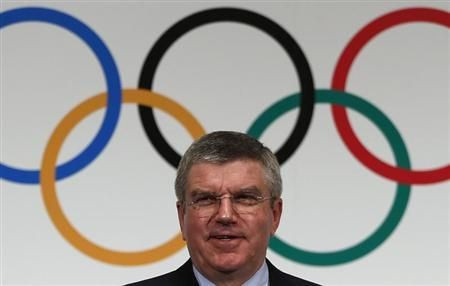IOC President Open To Baseball's Return At Tokyo Games

Baseball and softball could return to the Olympic program for the 2020 Tokyo Games, International Olympic Committee (IOC) president Thomas Bach said on Wednesday.
Bringing back the two sports, which were dropped from the Olympic program after 2008, is a hot-button topic in baseball-mad Japan.
Baseball and softball joined forces to bid against wrestling and squash for the one available berth at the 2020 and 2024 Games but missed out after the IOC voted to reinstate wrestling.
Baseball-softball finished second in the three-way ballot.
"Personally I am open to more flexibility in the program for the Olympic games," Bach said in response to a question at the start of a news conference in Tokyo. "But we must see what my colleagues are thinking about this."
Baseball and softball were on the Olympic program from 1992 to 2008 but voted out in a secret ballot in 2005, becoming the first sports to be removed since polo in 1936.
Bach, who was elected president at the same September IOC meeting where Tokyo was chosen to be the first city in Asia to host the Olympics for a second time, is expected to push through changes and has said there should be flexibility about the number of Olympic sports.
On Wednesday, he said the case for baseball/softball would be taken up at upcoming IOC meetings, including in December and in February.
ADJUSTMENTS
Bach, who is visiting Japan for the first time since taking the IOC top job, praised 2020 preparations so far and said he was unfazed by controversy about the cost and design of the main Olympic stadium, which is now set to be scaled back from original plans.
The spaceship-like stadium was designed by London architect Zaha Hadid, who also designed the aquatics centre for the London 2012 Olympics, to replace the ageing stadium built for the 1964 Tokyo Olympics.
Some architects opposed the design from the start, saying it would not blend with the surrounding environment and that building it would require cutting down trees, a precious commodity in crowded Tokyo.
Criticism grew when government officials said costs could balloon to as much as 300 billion yen ($2.99 billion) as opposed to the 130 billion yen in Tokyo's bid proposal, prompting Tokyo governor Naoki Inose to reject demands that Tokyo shoulder the burden.
Inose later said that the central government estimates expenses will run to some 185 billion yen.
Officials have said that costs will be cut by making the stadium building more compact, reducing the space for things such as exhibition rooms, and that plans for 80,000 seats - up from 54,000 in the current stadium - will not change.
"What I have heard about the Olympic stadium is that there were some plans about adjustments in the building," Bach said.
"But it will not affect at all the Olympic stadium as a sports facility."
The old stadium is scheduled to be demolished next year and the new facilities will be completed in time to host the rugby World Cup in 2019.
($1 = 100.2050 Japanese yen)
(By Elaine Lies; Editing by Sudipto Ganguly/Peter Rutherford)
© Copyright IBTimes 2024. All rights reserved.







